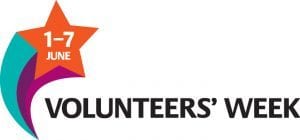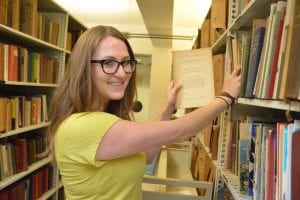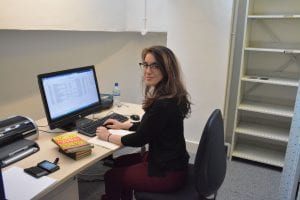Volunteers’ Week – A Day in the Life
By Nazlin Bhimani, on 5 June 2017

We continue with Volunteers’ Week during which we are saying an emphatic THANK YOU to every single person who has offered their time and expertise over the past year to UCL’s SCAR department, without whom many a project would have been difficult or even impossible to complete.
There are a wide range of roles that volunteers can take up within SCAR: helping with events, sorting through new collections, enhancing cataloguing, assisting in exhibition preparation, helping with our media and online communications. Throughout Volunteers’ Week we intend to share a snapshot of some of these roles with you. Each week day from 1st June to the 7th June, a guest volunteer writer will bring you a ‘day in their life’.
The third installment comes from the two volunteers, Ashley Zuelke and Teodora Lazar, working on the Lauwerys Collection at the Institute of Education Library.
Ashley Zuelke:
 Ralph Waldo Emerson once wrote: “If we encountered a man of rare intellect, we should ask him what books he read.” At UCL Institute of Education (IOE) Special Collections and Archives we are building a picture of Joseph A. Lauwerys and his life by listing all of the reading material in his personal library. I am one of two volunteers sifting through 28 double-stacked shelves full of books, academic journals, newsletters, meeting proceedings and more collected by Lauwerys, a Belgian-born scientist who became a leader in comparative education studies instrumental in the establishment of the (IOE) and the United Nations Educational, Scientific and Cultural Organization (UNESCO).
Ralph Waldo Emerson once wrote: “If we encountered a man of rare intellect, we should ask him what books he read.” At UCL Institute of Education (IOE) Special Collections and Archives we are building a picture of Joseph A. Lauwerys and his life by listing all of the reading material in his personal library. I am one of two volunteers sifting through 28 double-stacked shelves full of books, academic journals, newsletters, meeting proceedings and more collected by Lauwerys, a Belgian-born scientist who became a leader in comparative education studies instrumental in the establishment of the (IOE) and the United Nations Educational, Scientific and Cultural Organization (UNESCO).
Lauwerys’ life spanned 79 years, from 1902 to 1981, and the fraction of the books we have listed thus far illustrate how world wars and subsequent multinational collaboration and scientific advancements shaped his perspective. On a given day working with the collection, one comes across material published in more than eight languages on subjects ranging from chemistry theory, to morality, to educational systems in Chile. We note the details of each piece and scan them for marginalia, to see what he found important. Lauwerys’ collection considers all levels of education. Some of the earliest pieces appear to be his own textbooks. He also kept some publications of his speeches and journal articles, especially those published in multiple languages. In addition to writings on science and educational theory, he kept items like yearbooks from the USA and memorial programmes for colleagues.
Volunteering to work with this collection appealed to me because of my undergraduate degrees in journalism, international relations and comparative politics and the fact that my parents are retired educators. I am pursuing a Master’s of Science at UCL in business analytics and management to challenge myself in a more quantitative environment and to be prepared to help organisations make sense of large amounts of data and take action. Listing items in this collection has given me an affinity with Lauwerys, who was grounded in scientific thinking, but obviously honed qualitative and diplomatic skills as well throughout his life, embodying the spirit of what his contemporaries called “permanent education.”
Issues Lauwerys faced in his lifetime are not that different from conversations occurring today. His collection considers what technological change means for teaching; how education can advance shared democratic ideals and equality; and how to promote lifelong learning and job training. In international comparative fields like Lauwerys’, themes emerge that there may be clear distinctions among different countries, but ultimately, we all strive for similar values and ends; there is more that unites than divides. One item in the collection, a published keynote address given by Lauwerys, sums this up for teachers, ending with the words: “Similar ideals animate teachers everywhere, in every country and continent…We can learn much from one another because we are all trying sincerely to do the same kind of job and because we all believe that, through education, the world of the future can be made better than the world of today.”
Teodora Lazar:
 I am Teodora, one of the volunteers listing all of the reading material in Joseph A. Lauwerys’ personal library. I cannot tell which reason influenced me to work with the IOE’s Special Collections and Archives more: my studies in Art History and Material Studies which, by default, bring me closed to any piece of heritage and culture, or my passion for volunteering, which constantly challenges me to step beyond my comfort zone. But I know for sure that the mixture between these two reasons always manages to get me closer to who I want to be.
I am Teodora, one of the volunteers listing all of the reading material in Joseph A. Lauwerys’ personal library. I cannot tell which reason influenced me to work with the IOE’s Special Collections and Archives more: my studies in Art History and Material Studies which, by default, bring me closed to any piece of heritage and culture, or my passion for volunteering, which constantly challenges me to step beyond my comfort zone. But I know for sure that the mixture between these two reasons always manages to get me closer to who I want to be.
After all, it may seem that all we as volunteers at the IOE’s Special Collections and Archives is to work with books, but few words incorporate as much meaning and deep substance as a ‘book’ does. Taking a peek into Lauwerys’ personal collection I got to recognise multiple languages by just a few words written on the title, I discovered letters, newspaper pages and dedications from authors and, most of all, I now open every book with the hope and curiosity of finding something important. They’re not just books…
It goes without saying that the valuable work that Ashley and Teodora are doing will benefit future researchers. So a BIG thank you, Ashley and Teodora! We hope that the experience you gain from this will help you too in the future.
One Response to “Volunteers’ Week – A Day in the Life”
- 1
 Close
Close



[…] of the work done by one of our volunteers who you may have come across before in one of the Volunteer Week posts, Ashley Zuelke. As well as volunteering in Special Collections we have been lucky enough to have […]